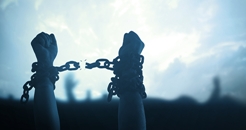 Case studies of modern slavery
Case studies of modern slavery
From a guide by Together Free
A Baptist Minister in an affluent area of South East England first met Izna at his church. He writes, 'Izna became a regular attender at our Sunday morning worship services. Izna was shy, she was nervous, and she was scared. The family she worked for would drop her off at the door and collect her exactly one hour after the service started; she was permitted to attend worship but not to engage with the other worshippers.
In our brief conversations it became clear that Izna was not paid properly for her work. She was unable to leave because the family she worked for had bought a small house for her family in India. She would had to stay to work in order to pay off the debt. Her husband is disabled and unable to work. Her children remained in India. The amount being removed from the debt it was claimed she owed the family was very small. It would have taken her many decades to pay off something that would have taken a short stay to do had she been paid at the UK minimum wage.
Izna was not allowed out of the house without permission. She thought she was located in London rather than Essex. The two sons in the house ridiculed her and dismissed her. The parents, both working as Doctors, showed little concern for Izna’s welfare. For over two years Izna pleaded with them that she could return home. Eventually they permitted her to do so. Izna could never walk out because her family in India would then be homeless. She could not speak out because the family denied her the opportunity, and they were well respected members of the local community.
It was a shock to those of us in the church who came to know Izna over her time with us that this situation was happening yards from our own homes. We have not heard from Izna since her return to India, but we pray that she is well and that she has been able to find good employment in or near her own family’.
Within the UK there are several broad categories of exploitation linked to Human Trafficking, including; Forced labour, Sexual exploitation, Domestic servitude, Organ harvesting, Child related crimes such as child sexual exploitation, forced begging, illegal drug cultivation, organised theft, related benefit frauds, etc., Forced marriage and illegal adoption.
Someone is in Modern Slavery if they are; forced to work through mental or physical threat, owned or controlled by an 'employer' - usually through mental or physical abuse or the threat of abuse, dehumanised - treated as a commodity or bought and sold as ‘property’, physically constrained or have restrictions placed on his/her freedom.
Here is another case study:
Jack lives in the suburbs of an English town. Although his parents separated, they were able to provide for their family. Jack was thirteen when one of his friends introduced him to Tony. Although Tony was only eight years older than Jack, he wore designer clothes and sported an expensive watch.
Tony was friendly and asked Jack if he wanted to make some money. Jack agreed. The money was easy. He just needed to transport a back-pack several miles away. Jack didn’t ask what was in the back-pack. Jack wanted the flash lifestyle promoted on gang music videos he’d seen on Youtube. He believed Tony that ‘he could make loads of dosh’.
As Jack’s experience increased he was given increased responsibility. A mobile phone with 30 numbers on it was given to him. This mobile phone line (or ‘countyline’) enabled Jack to contact and transport packages to the thirty people. This was done from a central flat in the community belonging to a man with learning difficulties. Tony and his mates had taken the over the flat as a ‘Traphouse’, where the drugs stored when brought from London.
Over time Jack realised he was transporting drugs. Although this made him uncomfortable, he was happy with his pay and the risks were low. The Police rarely searched teenagers. Some of his clients were rough and for his how protection he started carrying a knife.
Although Jack was happy with the money he received, his grades deteriorated at school. He started to go missing for short and then longer periods of time. His parents and teachers couldn’t understand what was happening and when Jack was confronted, he become aggressive and withdrew. Surrounded by older guys at the Traphouse, Jack started taking cannabis to help him cope with the stress. Sometimes he wanted to leave it all behind, but Tony told him, ‘it’s not that easy. We are your family now’.
Together Free have published a Guide to Modern Slavery and Safeguarding form which these case studies were taken. There is a lot more information and case studies in this guide for community and faith groups. Download the guide from here.
Retweet about this article:
From a guide by Together Free, 25/02/2020